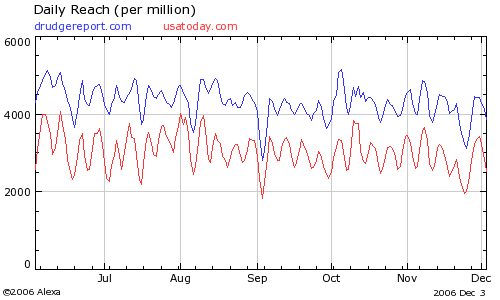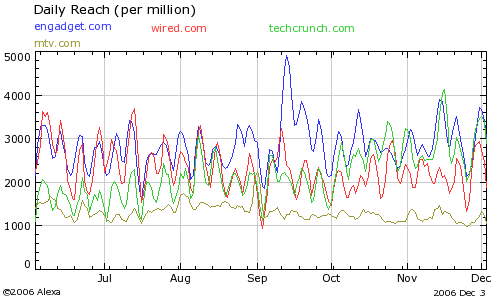Will “Amateurs” Lose Their Audience to Big Media?
Dec 4th, 2006 | By James Lewin | Category: Citizen Media, Commentary, Digital Video Downloads, Streaming Video, Video, Video Podcasts, VlogsAn editorial at MercuryNews.com (registration) argues that, as the popularity of Internet video booms, the popularity of amateur content will give way to big media.
“Whenever a new technology makes personal expression easier, from desktop publishing in the 1980s to video sharing in 2006, denizens of Silicon Valley leap to the same conclusion: Finally, amateurs will triumph over those self-satisfied professionals, kicking aside the titans of the publishing industry/music industry/movie industry/TV industry,” writes Mercury News’ Scott Kirsner.
“If Web video was dominated by citizens with camcorders in 2005 and 2006, the pendulum in the coming year will likely swing toward professional content producers and big media companies,” adds Kirsner.
Kirsner makes his case by pointing out that David Letterman clips get 900,000 views a day at YouTube, and that the iTunes store has sold about 500,000 full-length Disney movies.
While it’s inevitable that content from well-known personalities and companies will be popular, suggesting that mainstream content providers will crowd out so-called “amateur” content disregards the current state of Internet video, historical precedents for Web content and basic rules of economics.
While David Letterman, CNN, SNL and others are very popular, new Internet content providers, ranging from Tiki Bar TV to Rocketboom to French Maid TV, are also getting huge audiences, often much more cost-effectively than mainstream content providers.
Rocketboom’s Andrew Baron has noted that it’s possible to create successful Web video content very cheaply. Earlier in the year, Baron announced $80,000 advertising deals for a week’s worth of ads on Rocketboom. Rocketboom is produced with staff and gear that is minimal by the standards of traditional media.
Kirsner’s argument also disregards the historical precedent of other Web content
The introduction of the World Wide Web was a disruptive event that has led to the emergence of tens of thousands of successful independent content producers. The Web isn’t dominated by established offline brands. In fact, only 1 of the top 10 Web properties, as ranked by Alexa, come from a traditional media publisher.
Look beyond the top 10, and you find that many top Web sites are startups, and they routinely rank higher than the sites of well-established brand names.
Here’s a comparison of reach of the Drudge Report VS USA Today:

Finally, Kirsner seems to ignore the fact that the rapidly declining costs of publishing Web content make it cheaper than ever to become a publisher. This is creating a churning pool of startup content publishers. With so much competition, startups are constantly emerging that compete head-to-head with established publishers.
This Alexa graph plots Engadget and TechCrunch against Wired and MTV:

Though Engadget and TechCrunch are relative noobs to the world of publishing, their reach is similar to that of established publishers, despite the fact that they are relatively tiny operations.
At first glance, the Mercury News argument that established publishers are going to move in and take over the world of Web video sounds reasonable. However, when you consider the current state of video on the Web, the historical precedent of Web publishing, and the economics of publishing to the Web, it’s clear that mainstream television and film producers will have to work hard to translate their brands to the Web, and they will face stiff competition from a growing number of vloggers and video podcasters.
I think what is true is that *interesting* content gets viewed by choice. Good content gets “subscribed” to. When there’s a choice, shit gets discarded.
Interesting is a broad term, but could mean a well made think-piece about the political status of iraq, or a kid doing a back-flip off the top level of a shopping mall.
Subscription is a relatively new concept in terms of the technology (pre-recording VCR -> DVR/Tivo boxes -> RSS feeds) but age-old in the world of TV. TV networks have always supported the content that has lots of “subscribers” and canned the ones that don’t. One problem was that there was never a very accurate way to measure subscriptions before, and the number of available slots was so limited that they needed sure-fire, heavy hitters. Despite the millions of people out there making interesting content, the constrictive process of old media has resorted to a lot of filler.
What that article misleads is that not EVERY episode of letterman gets viewed 900,000 times. Probably the one where what’s-her-face flashed her tits, or some band’s performance, or some skit that was particularly funny… but it had *something*.. it wasn’t just another night of tuning in and falling asleep.
Now, the good and bad of new media: audiences have to be their own filters. Since it is so easy and cheap to produce, the signal-noise ratio is extremely high, and its not only the *good* stuff that sticks around. In my opinion, that’s a good thing, but it does make it harder to veg-out and just get good, interesting content to consume.
In many ways, its a parallel to the gluten of the western food culture. It’s extremely hard to be ‘lazy’ when it comes to finding food and still eat well. Nothing comes easy, and in many ways part of the fun and the reward is seeking out and finding good stuff. Good restaurants will always survive as long as they stay good. When you discover something like homestarrunner, it’s like finding a little specialty shop that makes great soups using only the freshest ingredients. Spoon feeding filler loaded with HFCS leads to a fat brain.
Why are “big media” tv shows doing well online- for the most part the people making them are very talented. Even the shittiest pop band has a guitarist who can play better then most people. So, what’s the most interesting/exciting prospect is when the really good people start making content themselves, and not just go to work for a big media company.
It’s not the company that makes [good] media, its the people.
There is a forgotten category here…
Just as there are only 7 Hollywood Studios…and, depending on your calculation, only 4 major Networks…
There are thousands, tens of thousands of Independent Productions and Production companies who churn out, sometimes, really engaging content.
But, they have not moved into the online space in any major way. One exception is the episodic drama being produced in Texas, http://www.alamoheightsSA.com — billed as a Tex-Mex Cybernovela, it is delivered in :07 minute episodes, monetized via product placement and paid advertising…and, shot in High Definition…
There could be thousands of these types of shows — produced independently that attract advertisers and exist somewhere between User Created and the Behemoths.
As many enertainment cognoscenti have observed, “You smoke your best dope first.”
The biggest advantage major media have is money. Trouble is, they’ve lost exclusive control over distribution, they don’t understand the new broadcast mechanisms, production factors are cheap enough to be in reach of teenagers singing in their bedrooms, and mainstream media don’t have enough money to re-establish control because they spent it on mergers. Entertainment no longer takes place in the hush of cathedrals. It’s out in the mosh of bazaars.
Yep, I’ve been saying for months now that the professionals are going to crowd in and leave us amateurs in the dust. I started my podcast last December when there were very few investing podcasts. Even Jim Cramer’s show wasn’t available as a podcast. Now there are an infinite number of investing podcasts from big companies and more every day. Remember, if it is cheap for us, it is also cheap for them.
I’m thinking that the only way to take my podcast to the next level is to be tied to a big corporate trademar, like “MarketWatch presents the Mad Money Machine” or “Paul Douglas Boyer from the Wall Street Journal.” Otherwise people won’t even give it a try. And I do believe that the quality of what I produce is superior to many, many so-called “professional” podcasts, if I may say so myself.
For mainstream topics, where the content is predominantly the same, it’s not the quality of the content, it’s the promotion and the access that counts more.
The big media outlets have the money to advertise and push their product, and because they get that big base quickly then word of mouth happens much faster.
Whilst there will always be exceptions to the rules, the small independent podcasts will flourish in the niche markets only, just like the web itself, where their minimal costs enable them to make a living that big orgs can’t.
But that’s not necessarily a bad thing. That way we get the broad spectrum of topics covered and not just those that the big boys can make a buck out of.
[…] via Podcasting News: An editorial at MercuryNews.com (registration) argues that, as the popularity of Internet video booms, the popularity of amateur content will give way to big media. ‚ÄúWhenever a new technology makes personal expression easier, from desktop publishing in the 1980s to video sharing in 2006, denizens of Silicon Valley leap to the same conclusion: Finally, amateurs will […] […]
I hate to agree…but I think there’s some truth to this trend if one follows the historical record.
In 1997, I heard the same conclusion about indepedent retailers—they will get crowded out by established corporations. I think the term CNN’s Chuck Roberts used was “the Vermont jam lady won’t be able to sell her wares?” and the response from the fancy Wall Street analyst was “perhaps, but bigger corporations will overtake her market”.
My take: The amateurs rise. The corporations take notice and move in. So far agree with the pendelum.
Then you plug in the niche factor, and you’ll get a similar effect as what we saw in the retailers. The Vermont lady did not become Smuckers Inc. Smucker’s DID become successful in selling jams. The lady might have had to reevaluate her approach or expectations of growth. In the end, there was space for both. The Vermont jam ladies of the world filling a niche and the Smucker’s of the world catering to mainstream demands.
Perhaps for podcasting that means that an increasing turn towards narrowcasting is in the works. I think it’s not bad news. There’s room for both, but as podcasters we might have to look at realistic expectations of growth.